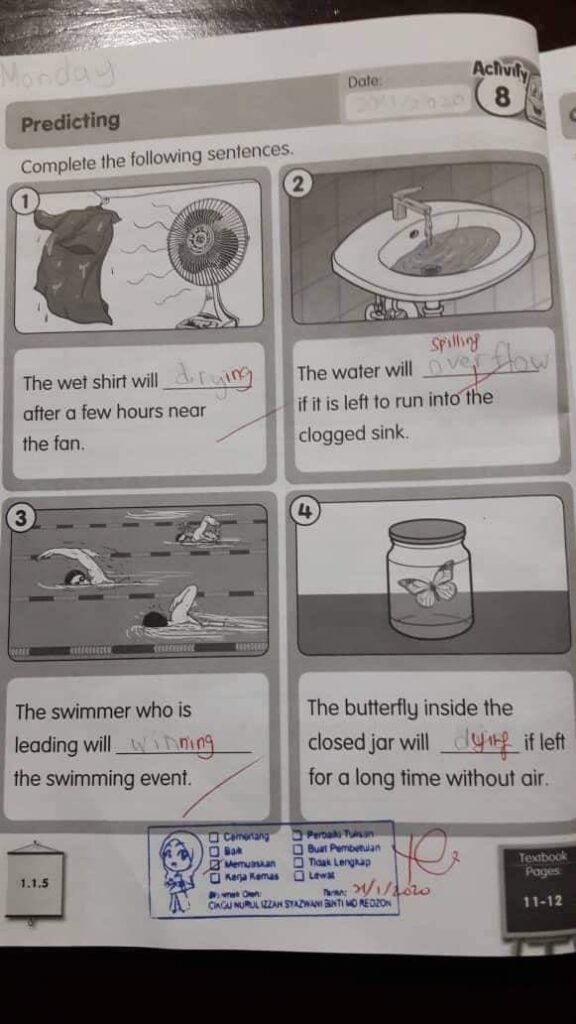Disclaimer: In Real Life is a platform for everyday people to share their experiences and voices. All articles are personal stories and do not necessarily echo In Real Life’s sentiments.
For those of us who went through the Malaysian education system, we were all taught English as a second language. Regardless of what language we learnt at home from our parents, local schools focus on primarily education in Bahasa Malaysia, our national language, and to a lesser degree we learn English as well. Of course, some of us did have supplementary lessons in Tamil or Mandarin as well.
The people of Malaysia are linguistically gifted: we speak many languages. But how good is our English? What are we taught in schools?
Many foreign students come to Malaysia to learn English, but what are locals taught?
Malaysia has a bilingual education system – so why aren’t we more proficient in English?

Source: expatgo
A lot of our subjects are taught in BM: sejarah, geografi, kemahiran hidup… Maths and science tend to flip-flop between being taught in English or BM, but otherwise schools focus on BM. Part of our English curriculum includes learning by reading novels, often highly simplified especially when compared to the BM novels we learnt in our komsas classes.
Unfortunately, in the Malaysian education system, rote memorisation is touted as the best way to learn and exams do not test for other skills that may be better to learn, like analysis or critical thinking – or even plain comprehension. Instead students are taught tips, tricks and techniques that will help them score better.
There’s a reason why those who can afford to would rather place their children in international schools or put them through a more developed nation’s education system, like Singapore or the UK.
And of course, the elite send their children to study overseas.
So what are our barriers to success in achieving a higher rate of proficiency in English?
1. The learning of English effectively has to be supplemented vigorously
Malaysians who speak English range from conversational to those who can speak it with native fluency. Many of us who speak it well do so because we were raised in English speaking families. Others have a heavy consumption of Western media, which necessitates picking up foreign slang as part of their English speech.
Few Malaysians speak English well because of the education system.
So is our standard of education in English dropping?
2. On social media, there are those who blame it on the standard of English teachers in local schools

Source: @aimaniabdullah (twitter)
Many have experiences with teachers who taught their classes improper English. There is definitely a problem with the poor standards of regulation for teachers in local schools.
A great inequality also exists between the urban and rural areas, and this is shown in matters of English proficiency. It is infinitely more likely to find an English speaker in the Klang Valley than in any rural area in Malaysia, for example.
3. Others say that there’s a shortage of good, qualified teachers
This is, in fact, very true. The Education Ministry amped up the search for teachers with a huge recruitment drive last year, but even until now they face a critical shortage of qualified teachers for English.
Another factor is that teachers are leaving the industry in droves, citing reasons such as “poor work-life balance” and “better money in tuition”. It’s just no longer rewarding to be a teacher when you’re compensated for your work and time so badly.
4. Less resources are given to those who are not academically gifted

Source: says
Being in the last class often murders any motivation to learn as teachers care less about those who are not as academic. Those in the top classes are often given the better teachers. Back when students were divided into streams, being placed in the arts stream was a death sentence. Although the practice of streams is no longer used, the problem remains: those who are academically gifted are given better opportunities for learning.
It all leads back to our education system needing a massive overhaul and creating opportunities for good teachers
Our education system needs to focus on teaching skills and imparting knowledge in a way that does not test only memory. And all students need to be taught well, not only the highest achievers.
Students need to learn how to learn first in order to tackle schooling, but they need to be guided by teachers who are both qualified and not overworked.

Source: iaea. Org
The issue of English proficiency in Malaysia is only a reflection of the flaws of our education system. Until those are dealt with appropriately, Malaysian students must continue to attend exam workshops that teach them mnemonics to memorise the syllabus.
For more stories like this, read: 5 Malaysians Talk About The Worst Lecturers They Had In Uni, Malaysia Has An Ongoing Brain Drain Problem: This Is Everything You Need To Know About It, and I Was In Peralihan Because I Failed My BM Paper, Here’s What It’s Like.
You might also like
More from Real Skills
How I Saved Almost RM50,000 On Buying My First Car
Here's how this Malaysian man with a RM3,500 salary saved RM50,000 on his first car.
Angry M’sian Boss Demands Unpaid Overtime Over Raya, Causes 9 Staff To Quit
An anonymous employee at a local SME shares how a bad-tempered boss eventually caused 9 staff to quit before Hari …
I Studied In Chinese School As A Malay Boy, Here’s What I Learnt
Every time I used Mandarin outside of school, family members would come up to me at gatherings and ask me …


















